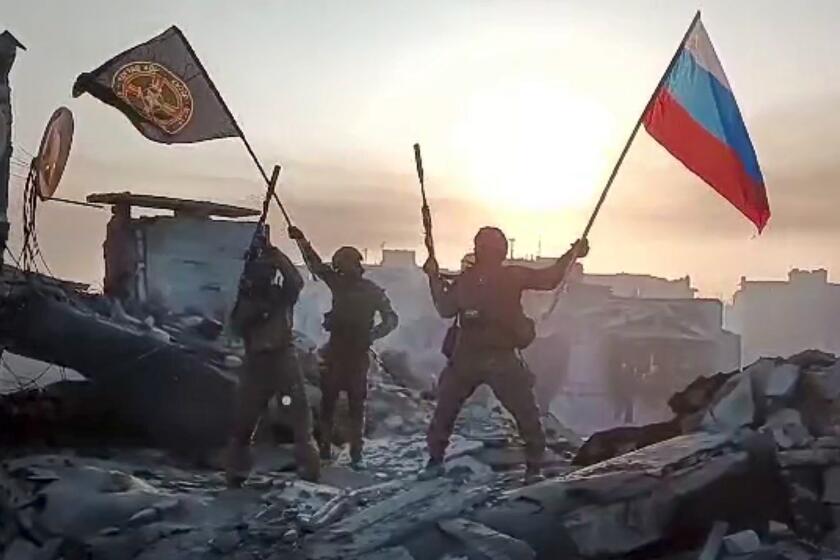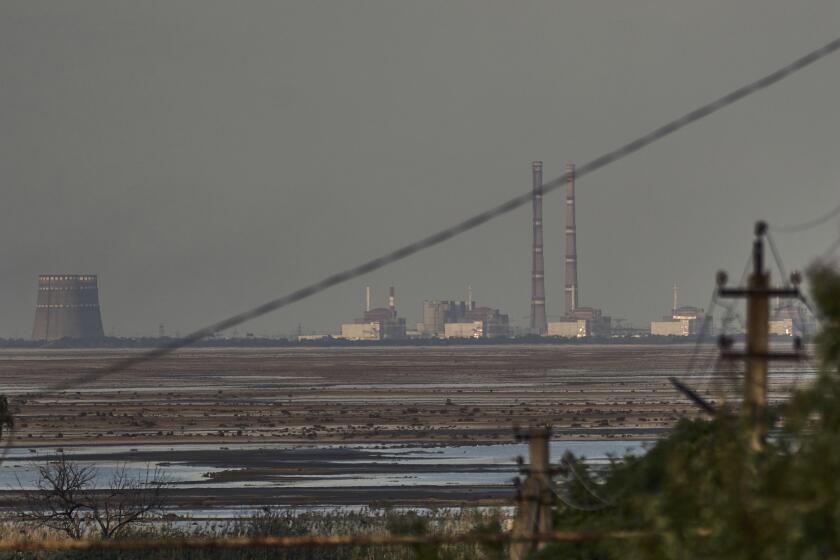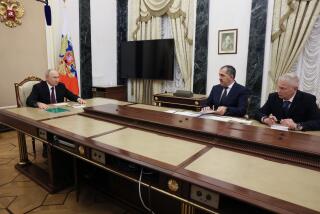Where’s Prigozhin? President of Belarus now says Wagner chief is back in Russia

- Share via
MINSK, Belarus — The Wagner mercenary leader who led a short-lived mutiny against the Kremlin is in Russia and his forces are in their field camps, the president of Belarus said Thursday, raising new questions about the deal that ended the extraordinary challenge to Russian President Vladimir Putin’s rule.
President Alexander Lukashenko’s claim could not be independently verified, and the Kremlin declined to comment on Yevgeny Prigozhin’s whereabouts. But Russian media have reported that he was recently seen at his offices in St. Petersburg.
It was not clear whether Prigozhin’s presence in Russia would violate the deal, which allowed the Wagner chief to move to Belarus in exchange for ending the rebellion and a promise of amnesty for him and his troops. But the reports suggested that the agreement might have allowed him to wind up his affairs in Russia.
If that’s true, it could mean that the threat posed by Prigozhin has not yet been fully defused and that the Kremlin is treading carefully until it can figure out what to do with troops who may still be loyal to him. Putin has said that Wagner troops can join the Russian military, retire from service or move to Belarus.
Much about the the agreement, which was brokered by Lukashenko, remains murky.
Last week, Lukashenko said the mercenary leader was in Belarus, but on Thursday he told international reporters that Prigozhin was in St. Petersburg and could also travel to Moscow if he wishes, while Wagner’s troops were in their camps. He did not specify the location of the camps, but Prigozhin’s mercenaries fought alongside Russian forces in eastern Ukraine before their revolt and also have bases on Russian territory.
Some convicts recruited by Russia’s private military contractor Wagner to fight in the war in Ukraine are coming home and committing new crimes.
He also said that Prigozhin has been given back the cash and weapons that were confiscated by Russian authorities.
Asked where Prigozhin is, Kremlin spokesman Dmitry Peskov shrugged off the question, saying that the Kremlin had neither the desire nor the means to track his movements — but reaffirmed that the deal that ended the mutiny envisaged his move to Belarus.
Lukashenko said his government offered Wagner, a private military contractor that has sent troops around the world to fight for Russia’s interests, the use of Belarusian military camps. But Lukashenko added that the company had not made a final decision.
The Kremlin has played down the fact that Prigozhin escaped punishment for his mutiny while other Putin critics have met with harsh prison sentences, exile or even death. The Kremlin has said that the deal with the Wagner chief was necessary to avoid massive bloodshed.
How do citizens of Kyiv cope with the sleep deprivation and stress from Russia’s war on Ukraine? Some push it down, some try yoga or dancing.
Lukashenko shrugged off suggestions that Putin might order Prigozhin killed, saying: “If you think that Putin is so vicious and vindictive to finish him off, no, it’s not going to happen.”
On Wednesday, Russian online newspapers Fontanka and Izvestia posted videos and photos of Prigozhin’s opulent mansion in St. Petersburg that showed stacks of cash, gold bullion and a jacket fully covered in medals Prigozhin was awarded, including the Hero of Russia medal, one of the country’s highest awards. Fontanka also published a collection of selfies that showed him posing in various wigs, fake beards and foreign uniforms, an apparent reflection of Wagner’s deployments to Syria and several African countries.
A photo hanging in the mansion showed a lineup of decapitated heads. In one published image, an oversized souvenir sledgehammer could also be seen with the inscription “For important negotiations.” The sledgehammer has become a symbol of Wagner after reports of its troops using the tool to beat defectors to death.
Asked whether Prigozhin and his mercenaries were going to move to Belarus, Lukashenko answered evasively that it would depend on the decisions of the Wagner chief and the Russian government. The Belarusian leader said that he didn’t think Wagner’s presence in his country could lead to its destabilization and that any Wagner troops would be required to sign a contract with Belarusian authorities outlining conditions and limits on their actions.
Ukraine and Russia have accused each other of planning to attack one of the world’s largest nuclear power plants.
He dismissed suggestions that the mercenaries could attack Ukraine from Belarusian territory, which Russian troops used as a staging ground ahead of their invasion of Ukraine in February 2022. Moscow has also maintained a military presence in Belarus.
During their short revolt, Wagner forces quickly swept into the southern Russian city of Rostov-on-Don and captured the military headquarters there before marching on Moscow in what Prigozhin described as a “march of justice” to oust the Russian defense minister and the chief of the military’s General Staff.
The Wagner fighters faced little resistance, smashing occasional roadblocks and downing at least six helicopters and a command post aircraft, killing at least 10 airmen.
When the deal was struck, the Wagner chief ordered his troops to return to their camps.
Breaking News
Get breaking news, investigations, analysis and more signature journalism from the Los Angeles Times in your inbox.
You may occasionally receive promotional content from the Los Angeles Times.
The abortive rebellion represented the biggest threat to Putin in his more than two decades in power, exposing weaknesses in the Kremlin and eroding his authority.
Lukashenko said he warned Prigozhin that he and his troops would be destroyed if they failed to make a deal to end their mutiny and that Belarus would send a brigade to help protect Moscow.
“It was necessary to nip it in the bud. It was very dangerous, as history shows,” Lukashenko said.
Asked about the deployment of Russia’s tactical nuclear weapons to Belarus, Lukashenko said they were intended to deter any aggression against the country. Putin and Lukashenko have both said that some of the weapons already have been moved to Belarus, and the Belarusian leader reaffirmed Thursday that a “certain number” of them had been flown to Belarus and the rest would be delivered before year’s end.
Lukashenko said Russia would consult him on any possible use of those weapons, adding that it could happen only in response to an act of aggression by NATO against Russia or Belarus.
“If I don’t want something, if our people and the state don’t want it, it means it won’t happen,” he said.
“These weapons serve strictly defensive purposes,” he added. “Don’t touch us, and we will never use these deadly weapons.”
More to Read
Sign up for Essential California
The most important California stories and recommendations in your inbox every morning.
You may occasionally receive promotional content from the Los Angeles Times.













